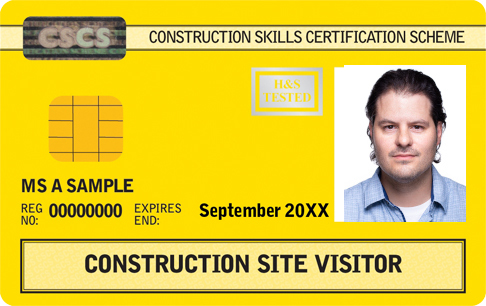One of the key foundations for safe construction is to ensure that all workers are capable and competent in their chosen field and that each person has a clear understanding of the health and safety rules. Although each site is unique, health and safety are universal. The Government’s Construction (Design and Management) Regulations 2015 (CDM 2015) detail what companies and employees need to do protect themselves and others from harm. One step towards meeting these requirements is to insist on all workers carrying a relevant Construction Skills Certification Scheme (CSCS) card.

What is a CSCS card?
CSCS cards enable individuals to demonstrate their competence to undertake construction tasks safely. Cards are awarded by the CSCS following a thorough check of relevant qualifications, as well as independent testing of health and safety skills. Although CSCS cards aren’t legislative – construction companies and clients to demonstrate that sites meet Government requirements for health and safety – the cards can be a simple way to demonstrate compliance without detailed in-house checks and testing. For this reason, many contractor companies and clients rely on CSCS cards and many enforce their use for all staff on site.
A different CSCS card for every role and responsibility
There are many CSCS card types available, depending on the level of qualification, experience and job requirements. Most require a level of recognised qualification and/or proven experience on the job, and all require the cardholder to sit the Construction Industry Training Board (CITB) Health, Safety and Environment (HS&E) test. A pass on this independent test demonstrates that the cardholder can be safe on a construction site.
CSCS card types range from Trainee and Apprentice levels, where cardholders are working towards particular construction qualifications, through to general Labourer cards, demonstrating RQF Level 1 in Health and Safety in a Construction Environment (or equivalent), right the way through to Managerial, Academic and Professional cards. Each CSCS card type validates the qualifications needed to work at that level and shows competency in working safely within the Government’s regulatory framework.
A wide range of partner card schemes are also validated through CSCS and are permitted to use the CSCS logo. These cards are typically for more specialised roles or tasks, such as asbestos removal, demolition, scaffolding, construction plant operation and heating, ventilation and air-conditioning (HVAC) installation.
Every construction worker has a responsibility to work within health and safety guidelines, to keep themselves and their co-workers safe. We know that health and safety is everyone’s responsibility, but overall site safety sits firmly with the construction company and its client, particularly when it comes to specific requirements such as COSHH. By ensuring all workers carry a valid CSCS card, managers can take a step towards meeting their health and safety regulations on-site.
How do CSCS cards form part of site-wide health and safety management?
CSCS cards are just one step towards robust health and safety standards. By using a digital construction management tool, such as PlanRadar, site managers can easily access a bank of qualify workers to complete tasks. CSCS card registered workers can be uploaded to the system according to their experience and qualifications. Building inspections can take place using personalised templates that reflect the unique characteristics of the site and defects can be recorded and appended directly to the site plan. Detailed information about the task can be added directly to the ticket, including photos, recorded notes and documents. The supervisor can then allocate the task directly to a competent worker, set deadlines and follow the task through to completion. Supervisors can feel confident that an experienced and qualified worker is completing the task and that health and safety requirements are understood and fulfilled.
CSCS card expiry dates can be recorded within the PlanRadar tool, with alerts sent as cards need updating. Workers can be reminded to retake their CITB Health, Safety and Environment (HS&E) test and as workers complete more qualifications and achieve new skills, they can provide new CSCS card evidence, changing their status within the PlanRadar planning tools. This integrated and flexible tool allows managers to see where gaps lie in their skill base, where external contractors may be needed to do specialist tasks or where safety adjustments are required.
PlanRadar takes health and safety one step further by enabling health and safety audits through its integrated digital platform. Using standardised templates, for everything from COSHH to fire regulations, safety officers can conduct regular inspections, highlight areas of concern and appoint teams to address issues.
For more information on PlanRadar and how it can help your team to be safe on-site, contact us or…

